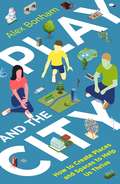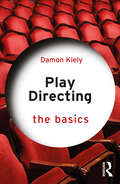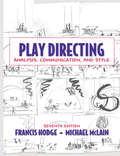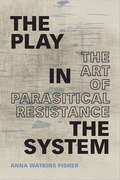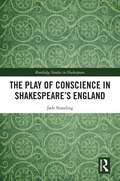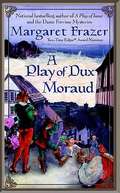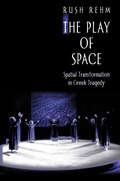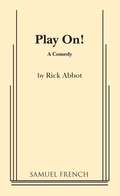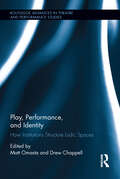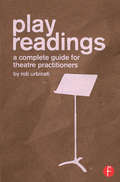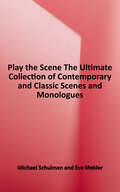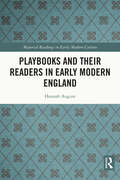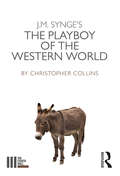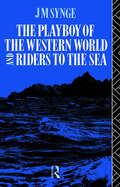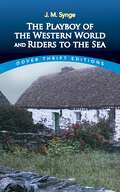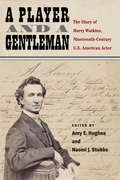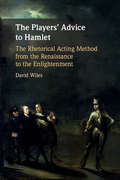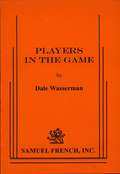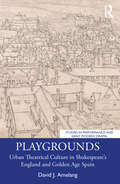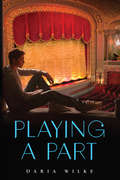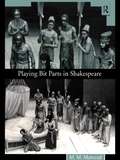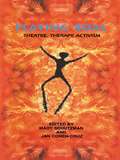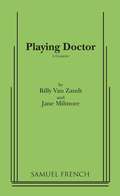- Table View
- List View
Play and the City: How to Create Places and Spaces To Help Us Thrive
by Alex BonhamPlay is essential, for children but also adults. It's how we relax and revitalise ourselves, build and maintain friendships, try new things, learn and innovate.Cities have always been sites of play, bringing people together and pushing the boundaries of what is humanly possible. And now we need our cities to encourage and facilitate play of all kinds more than ever. If we want a world for our children to play in, we need to have a go at doing things differently. A city that is enjoyable to live in - that provides welcoming spaces, plentiful resources, and an attitude of 'yes, you can' - is a playful city. A city that is good for eight-year-olds as well as eighty-year-olds is a city that's good for all of us. By looking at how different cities across space and time have sought to encourage and facilitate play, Bonham shows us how to conceptualise our own contemporary city as a game, and encourages us to become participants rather than spectators.Play the city! Get involved, make a difference and help to bring your city back to life. There is help here to identify opportunities, build a team of friends and allies, take part - and win! It's time to make your move.
Play Directing: The Basics (The Basics)
by Damon KielyPlay Directing: The Basics introduces theatre students to a step-by-step process for directing plays, including advice on devising. Beginning with a historical overview of directing, this book covers every aspect of the director’s job from first read to closing night. Practical advice on finding plays to produce, analysing scripts, collaborating with the design team, rehearsing with actors, devising company creations, and opening a show are peppered with advice from working professionals and academic directors. A practical workbook, short exercises, helpful websites, and suggested reading encourage readers towards a deeper study of the art of directing. This book empowers high school and early college students interested in theatre and directing to find their own voice, develop a practice, and refine their process.
Play Directing: Analysis, Communication, and Style
by Michael Mclain Francis HodgePlay Directing describes the various roles a director plays, from selection and analysis of the play, to working with actors and designers to bring the production to life.
The Play in the System: The Art of Parasitical Resistance
by Anna Watkins FisherWhat does artistic resistance look like in the twenty-first century, when disruption and dissent have been co-opted and commodified in ways that reinforce dominant systems? In The Play in the System Anna Watkins Fisher locates the possibility for resistance in artists who embrace parasitism—tactics of complicity that effect subversion from within hegemonic structures. Fisher tracks the ways in which artists on the margins—from hacker collectives like Ubermorgen to feminist writers and performers like Chris Kraus—have willfully abandoned the radical scripts of opposition and refusal long identified with anticapitalism and feminism. Space for resistance is found instead in the mutually, if unevenly, exploitative relations between dominant hosts giving only as much as required to appear generous and parasitical actors taking only as much as they can get away with. The irreverent and often troubling works that result raise necessary and difficult questions about the conditions for resistance and critique under neoliberalism today.
The Play of Conscience in Shakespeare’s England (Routledge Studies in Shakespeare)
by Jade StandingHaving a conscience distinguishes humans from the most advanced AI systems. Acting in good conscience, consulting one’s conscience, and being conscience-wracked are all aspects of human intelligence that involve reckoning (deriving general laws from particular inputs and vice versa), and judgement (contemplating the relationship of the reckoning system to the world). While AI developers have mastered reckoning, they are still working towards the creation of judgement. This book sheds light on the reckoning and judgement of conscience by demonstrating how these concepts are explored in Everyman, Doctor Faustus, The Merchant of Venice, and Hamlet. Academic, student, or general-interest readers discover the complexity and multiplicity of the early modern concept of conscience, which is informed by the scholastic intellectual tradition, juridical procedures of the court of Chancery, the practical advice of Protestant casuistry, and Reformation theology. The aims are to examine the rubrics for thinking through, regulating, and judging actions that define the various consciences of Shakespeare’s day, to use these rubrics to interpret questions of truth and action in early modern plays, and to offer insights into what it is about conscience that developers want to grasp to eliminate the difference between human and non-human intelligences, and achieve true AI.
A Play of Dux Moraud (A Joliffe Mystery #2)
by Margaret FrazerPerforming at the wedding of Sir Edmund Deneby's daughter, the player Joliffe has another task to perform--as a spy. <P><P>As he uncovers the secrets of the Denebys' sordid history, it becomes clear that this wedding celebration is destined to end in tragedy.
The Play of Space: Spatial Transformation in Greek Tragedy
by Rush RehmIs "space" a thing, a container, an abstraction, a metaphor, or a social construct? This much is certain: space is part and parcel of the theater, of what it is and how it works. In The Play of Space, noted classicist-director Rush Rehm offers a strikingly original approach to the spatial parameters of Greek tragedy as performed in the open-air theater of Dionysus. Emphasizing the interplay between natural place and fictional setting, between the world visible to the audience and that evoked by individual tragedies, Rehm argues for an ecology of the ancient theater, one that "nests" fifth-century theatrical space within other significant social, political, and religious spaces of Athens. Drawing on the work of James J. Gibson, Kurt Lewin, and Michel Foucault, Rehm crosses a range of disciplines--classics, theater studies, cognitive psychology, archaeology and architectural history, cultural studies, and performance theory--to analyze the phenomenology of space and its transformations in the plays of Aeschylus, Sophocles, and Euripides. His discussion of Athenian theatrical and spatial practice challenges the contemporary view that space represents a "text" to be read, or constitutes a site of structural dualities (e.g., outside-inside, public-private, nature-culture). Chapters on specific tragedies explore the spatial dynamics of homecoming ("space for returns"); the opposed constraints of exile ("eremetic space" devoid of normal community); the power of bodies in extremis to transform their theatrical environment ("space and the body"); the portrayal of characters on the margin ("space and the other"); and the tragic interactions of space and temporality ("space, time, and memory"). An appendix surveys pre-Socratic thought on space and motion, related ideas of Plato and Aristotle, and, as pertinent, later views on space developed by Newton, Leibniz, Descartes, Kant, and Einstein. Eloquently written and with Greek texts deftly translated, this book yields rich new insights into our oldest surviving drama.
Play On!
by Rick AbbotComedyCharacters: 3 male, 7 female . Interior Set. Perfect for any theatre group, this is the hilarious story of a theater group trying desperately to put on a play in spite of maddening interference from a haughty authoress who keeps revising the script. Act I is a rehearsal of the dreadful show, Act II is the near disastrous dress rehearsal, and the final act is the actual performance in which anything that can go wrong does. When the authoress decides to give a speech on the state of the modern theatre during the curtain calls, the audience is treated to a madcap climax to a thoroughly hilarious romp. Even the sound effects reap their share of laughter.
Play, Performance, and Identity: How Institutions Structure Ludic Spaces (Routledge Advances in Theatre & Performance Studies)
by Matt Omasta Drew ChappellPlay helps define who we are as human beings. However, many of the leisurely/ludic activities people participate in are created and governed by corporate entities with social, political, and business agendas. As such, it is critical that scholars understand and explicate the ideological underpinnings of played-through experiences and how they affect the player/performers who engage in them. This book explores how people play and why their play matters, with a particular interest in how ludic experiences are often constructed and controlled by the interests of institutions, including corporations, non-profit organizations, government agencies, religious organizations, and non-governmental organizations (NGOs). Each chapter explores diverse sites of play. From theme parks to comic conventions to massively-multiplayer online games, they probe what roles the designers of these experiences construct for players, and how such play might affect participants' identities and ideologies. Scholars of performance studies, leisure studies, media studies and sociology will find this book an essential reference when studying facets of play.
Play Readings: A Complete Guide for Theatre Practitioners
by Rob UrbinatiPlay Readings: A Complete Guide for Theatre Practitioners demystifies the standards and protocols of a play reading, demonstrating how to create effective and evocative readings for those new to or inexperienced with the genre. It examines all of the essential considerations involved in readings, including the use of the venue, pre-reading preparations, playwright/director communication, editing/adapting stage directions, casting, using the limited rehearsal time effectively, simple "staging" suggestions, working with actors, handling complex stage directions, talkbacks, and limiting the use of props, costumes, and music. A variety of readings are covered, including readings of musicals, operas, and period plays, for comprehensive coverage of this increasingly prevalent production form.
Play the Scene: The Ultimate Collection of Contemporary and Classic Scenes and Monologues
by Michael Schulman Eva MeklerAlexander Dumas - Christopher Durang - Beth Henley - Kenneth Lonergan - Donald Margulies - Steve Martin - Nicky Silver - Bernard Shaw - Alfred Uhry - Paula Vogel A collection of the greatest scenes and monologues ever written ranging from Elizabethan to Tony Award-winning plays comprehensive anthology spans over five hundred years of theatre. Play the Scene: The Ultimate Collection of Contemporary and Classic Scenes and Monologues by coauthors Michael Schulman and Eva Mekler includes scenes and monologues from classic plays by such notable authors as Edith Wharton as well as the best in contemporary theatre, such as Margaret Edson's Wit. - Blight Spirit - Camille - The Chosen - The Graduate - How I Learned to Drive - The Last Night of Ballyhoo - The Lisbon Traviata - This Is Our Youth - Vincent in Brixton - And many more!
Playbooks and their Readers in Early Modern England (Material Readings in Early Modern Culture)
by Hannah AugustThis book is the first comprehensive examination of commercial drama as a reading genre in early modern England. Taking as its focus pre-Restoration printed drama’s most common format, the single-play quarto playbook, it interrogates what the form and content of these playbooks can tell us about who their earliest readers were, why they might have wanted to read contemporary commercial drama, and how they responded to the printed versions of plays that had initially been performed in the playhouses of early modern London. Focusing on professional plays printed in quarto between 1584 and 1660, the book juxtaposes the implications of material and paratextual evidence with analysis of historical traces of playreading in extant playbooks and manuscript commonplace books. In doing so, it presents more detailed and nuanced conclusions than have previously been enabled by studies focused on works by one author or on a single type of evidence.
The Playboy of the Western World (The Fourth Wall)
by Christopher Collins‘I’m thinking this night wasn’t I a foolish fellow not to kill my father in years gone by.’ – Christy Mahon On the first night of J. M. Synge’s The Playboy of the Western World (1907) the audience began protesting in the theatre; by the third night the protests had spilled onto the streets of Dublin. How did one play provoke this? Christopher Collins addresses The Playboy ’s satirical treatment of illusion and realism in light of Ireland’s struggle for independence, as well as Synge’s struggle for artistic expression. By exploring Synge’s unpublished diaries, drafts and notebooks, he seeks to understand how and why the play came to be. This volume invites the reader behind the scenes of this inflammatory play and its first performances, to understand how and why Synge risked everything in the name of art.
Playboy of the Western World: A Comedy In Three Acts (Classic, 20th-century, Penguin Ser.)
by J.M SyngeFirst published in 1979. Routledge is an imprint of Taylor & Francis, an informa company.
The Playboy of the Western World and Riders to the Sea (Dover Thrift Editions: Plays)
by J. M. SyngeTwo beautifully crafted dramas set among the folk of the Aran Islands and western Irish coastlands. The Playboy of the Western World deals with its young hero's progress, in the eyes of others, from timid weakling to paragon of bravery. Riders to the Sea is a dark elegy to the fragile existence of those who live at the mercy of the sea. Reprinted from authoritative editions, complete with Synge's preface to The Playboy of the Western World. New introductory Note.
A Player and a Gentleman: The Diary of Harry Watkins, Nineteenth-Century U.S. American Actor
by Amy E Hughes Naomi J StubbsHardworking actor, playwright, and stage manager Harry Watkins (1825–94) was also a prolific diarist. For fifteen years Watkins regularly recorded the plays he saw, the roles he performed, the books he read, and his impressions of current events. Performing across the U.S., Watkins collaborated with preeminent performers and producers, recording his successes and failures as well as his encounters with celebrities such as P. T. Barnum, Junius Brutus Booth, Edwin Forrest, Anna Cora Mowatt, and Lucy Stone. His is the only known diary of substantial length and scope written by a U.S. actor before the Civil War—making Watkins, essentially, the antebellum equivalent of Samuel Pepys. Theater historians Amy E. Hughes and Naomi J. Stubbs have selected, edited, and annotated excerpts from the diary in an edition that offers a vivid glimpse of how ordinary people like Watkins lived, loved, struggled, and triumphed during one of the most tumultuous periods in U.S. history. The selections in A Player and a Gentleman are drawn from a more expansive digital archive of the complete diary. The book, like its digital counterpart, will richly enhance our knowledge of antebellum theater culture and daily life in the U.S. during this period.
The Players' Advice to Hamlet: The Rhetorical Acting Method from the Renaissance to the Enlightenment
by David WilesHamlet is a characteristic intellectual more inclined to lecture actors about their craft than listen to them, and is a precursor of Enlightenment figures like Diderot and Lessing. This book is a quest for the voice of early professional actors, drawing on English, French and other European sources to distinguish the methods of professionals from the theories of intellectual amateurs. David Wiles challenges the orthodoxy that all serious discussion of acting began with Stanislavski, and outlines the comprehensive but fluid classical system of acting which was for some three hundred years its predecessor. He reveals premodern acting as a branch of rhetoric, which took from antiquity a vocabulary for conversations about the relationship of mind and body, inside and outside, voice and movement. Wiles demonstrates that Roman rhetoric provided the bones of both a resilient theatrical system and a physical art that retains its relevance for the post-Stanislavskian performer.
Players in the Game
by Dale WassermanDrama / 9m, 4f / Unit Set / The Bishop of fourteenth century Prague is humane, witty and happily immoral, which suits his city just fine. However, it displeases the Pope who sends a clever young Inquisitor to force obedience from the Bishop, triggering a collision that ends shockingly. You’ll recognize the game as that old, “Who’s Got The Power?” but you’ve never seen it played for such amazing stakes.
Playgrounds: Urban Theatrical Culture in Shakespeare’s England and Golden Age Spain (Studies in Performance and Early Modern Drama)
by David J. AmelangThis book compares the theatrical cultures of early modern England and Spain and explores the causes and consequences not just of the remarkable similarities but also of the visible differences between them. An exercise in multi-focal theatre history research, it deploys a wide range of perspectives and evidence with which to recreate the theatrical landscapes of these two countries and thus better understand how the specific conditions of performance actively contributed to the development of each country’s dramatic literature. This monograph develops an innovative comparative framework within which to explore the numerous similarities, as well as the notable differences, between early modern Europe’s two most prominent commercial theatre cultures. By highlighting the nuances and intricacies that make each theatrical culture unique while never losing sight of the fact that the two belong to the same broader cultural ecosystem, its dual focus should appeal to scholars and students of English and Spanish literature alike, as well as those interested in the broader history of European theatre. Learning from what one ‘playground’ – that is, the environment and circumstances out of which a dramatic tradition originates – reveals about the other will help solve not only the questions posed above but also others that still await examination. This investigation will be of great interest to students and scholars in theatre history, comparative drama, early modern drama, and performance culture.
Playing a Part
by Daria Wilke Marian SchwartzThe first young adult novel translated from Russian, a brave coming-out, coming-of-age story.In June 2013, the Russian government passed laws prohibiting "gay propaganda," threatening jail time and fines to offenders. That same month, in spite of these harsh laws, a Russian publisher released PLAYING A PART, a young adult novel with openly gay characters. It was a brave, bold act, and now this groundbreaking story has been translated for American readers.In PLAYING A PART, Grisha adores everything about the Moscow puppet theater where his parents work, and spends as much time there as he can. But life outside the theater is not so wonderful. The boys in Grisha's class bully him mercilessly, and his own grandfather says hateful things about how he's not "masculine" enough. Life goes from bad to worse when Grisha learns that Sam, his favorite actor and mentor, is moving: He's leaving the country to escape the extreme homophobia he faces in Russia. How Grisha overcomes these trials and writes himself a new role in his own story is heartfelt, courageous, and hopeful.
Playing a Part in History
by Margaret RogersonThe York Mystery Plays are a cycle of originally performed on wagons in the city. They date from the fourteenth century and Biblical narrative from Creation to Last Judgment. After nearly four hundred years without a performance, a revival of the York Mysteries began in 1951 when local amateurs led by professional theatre practitioners staged them during the festival of Britain. Playing a Part in History examines the ways in which the revival of these plays transformed them for twentieth- and twenty-first-century audiences. Considering such topics as the contemporary popularity of the plays, the agendas of the revivalists, and major production differences, Margaret Rogerson provides a fascinating comparison of medieval and modern English drama. Drawing extensively on archival material, and newspaper and academic reviews of the plays in recent years, Playing a Part in History is not only an illuminating account of early English drama, but also of the ways in which theatre allows people to interact with the past.
Playing Bit Parts in Shakespeare
by Professor M Mahood M.M. MahoodPlaying Bit Parts in Shakespeare is a unique survey of the small supporting roles - such as foils, feeds, attendants and messengers - that feature in Shakespeare's plays. Exploring such issues as how bit players should conduct themselves within a scene, and how blank verse or prose may be spoken to bring out the complexities of character-definition, Playing Bit Parts in Shakespeare brings a wealth of insights to the dynamic of scenic construction in Shakespeare's dramaturgy. M.M. Mahood explores the different functions of minimal characters, from clearing the stage to epitomizing the overall effect of the comedy or tragedy, and looks at how they can extend the audience's knowledge of the social world of the play. She goes on to describe the entire corpus of minimal roles in a selection of six plays: * Richard III * The Tempest * King Lear * Antony & Cleopatra * Measure for Measure * Julius Caesar This new edition comes enhanced with a new Appendix, 'Who Says What', especially designed to aid directors in making decisions about the speaking parts of the minimal characters. It also comes complete with an index of characters (including line references) as well as a detailed general index. An invaluable aid for directors and actors in the rehearsal room, this perceptive and informative volume is equally of interest to students studying and writing about Shakespeare's plays.
Playing Boal: Theatre, Therapy, Activism
by Mady Schutzman Jan Cohen-CruzPlaying Boal examines the techniques in application of Augusto Boal, creator of Theatre of the Oppressed, Brazilian theatre maker and political activist. This text looks at the use of the Theatre of the Oppressed exercises by a variety of practitioners and scholars working in Europe, North America and Canada. It explores the possibilities of these tools for "active learning and personal empowerment; co-operative education and healing; participatory theatre and community action." This collection is designed to illuminate and invigorate discussion about Augusto Boal's work and the transformative potential of theatre. It includes two interviews with Boal, and two pieces of his own writing.
Playing Doctor
by Billy Van ZandtFarce / 5m, 3f / Int. Rob Brewster's parents are very, very proud of their son the doctor. What they don't know is that Rob has used all the money they gave him for medical school to live on as he as has pursued his fledgling writing career. Inevitably, Rob's day of reckoning comes when his parents arrive for a visit. Quickly, he enlists the help of his secretary to be his nurse and his roommate Jimmy to round up his actor friends to pretend to be patients. Complications ensue when Jimmy decides he is such a good actor that he can impersonate all the patients, with the help of a trunk of costumes and bad dialects! The authors have written some zany farces but this one may just be their zaniest. It is great fun to perform, and great fun to see. "Wonderful... wacky comedy... will undoubtedly become standard dinner theatre fare across the country... contains more wit than is usual in sex farce." - Asbury Park Press
